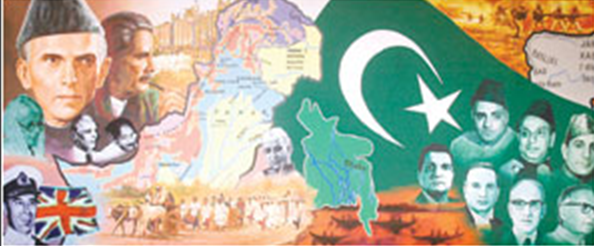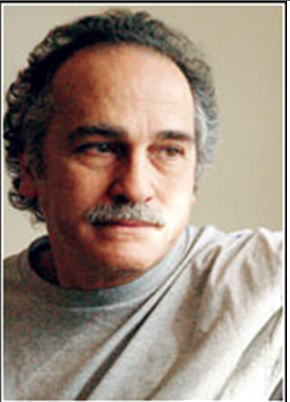Jamil Dehlavi
This is a collection of articles archived for the excellence of their content. Readers will be able to edit existing articles and post new articles directly |
Jamil Dehlavi
Jamil Dehlavi
A man of images
By Sahar Ali
Jamil Dehlavi is a man of images, not words. Shy, unassuming, soft-spoken, a trifle disheveled and often at a loss for words, he is ill at ease speaking into a dictaphone and even more so in front of a camera. But that’s because he has always been behind the camera, conjuring images, imagining them, using words to weave them into scripts, and using the camera to capture them on celluloid.
“I based the entire film on that one image,” he tells a member of the audience for Infinite Justice during the Q&A after the screening of the film. He has recently completed the film which is more than ‘loosely based’ on the case of Daniel Pearl, the American Jewish reporter of The Wall Street Journal who was taken hostage while in pursuit of a story about terrorist networks, and killed by his captors in Pakistan. While the story draws inspiration from Daniel Pearl, Dehlavi has fictionalised the characters.
The print journalist Daniel Pearl has become Jewish American TV reporter, Arnold Silverman, of the Associated Broadcast News Network. The image in question is not a pleasant one. It is the image of Silverman’s severed head, the same fate that Pearl met at the hands of his captors.
“The whole film was built around that image,” says Dehlavi. “It’s a shocking image, but a terribly important one.” Does he have a taste for the macabre? It’s a question that takes him by surprise, flustering him more than he is already at being interviewed and photographed simultaneously.
His fascination for the ghoulish and grisly is to be seen in other films. In Born of Fire, which Dehlavi made in 1983, an eclipse is represented by the shadow of a skull falling on the sun. While one critic has described Born of Fire as “an Islamic horror film”, a viewer appreciating the powerful symbology of its imagery says, “The cinematography of this film is so gorgeous you could watch it with the sound off.”
“You make it sound as if I make Dracula films!” Dehlavi complains good-naturedly, his light eyes suddenly animated. Defending Born of Fire, Dehlavi says it has no blood and gore but is a surreal fantasy. Another film which he partly produced, Passion in the Desert, has some gory scenes of battle and another scene with the disturbing sounds of a leopard eating a man. Dehlavi argues that Passion in the Desert is not his story. He merely produced part of it, the part that was filmed in Jordan.
Another dominant feature of Dehlavi’s work is his interest in spiritual or religious themes. In Blood of Hussain, Dehlavi chose to set the story of Prophet Mohammad’s (peace be upon him) martyred grandsons in Pakistan in the 1970s where two brothers challenge the might of a military dictator, one opportunistically while the other, prophesied to lead the masses to a better life, chooses a more direct but perilous path.
Immaculate Conception, also set in 1980s Pakistan, explores the phony spirituality of the sufi shrine culture. A childless American woman seeks divine intervention to become pregnant at a shrine run by a transvestite in Karachi. In Passover, which Dehlavi describes as a Flamenco passion play, a Spaniard is crucified.
Dehlavi explains his inclination towards spiritual subjects as something to do with images. “Religion is a very interesting subject, a very visual subject,” he says. “There are a lot of images in religion. I’m attracted to it because I use those images in my films.”
Although Dehlavi’s films are mostly in and about Pakistan, they are little known here. In fact, I was only able to find Immaculate Conception in a local DVD store. Interestingly, the cover for the DVD carries the design for Madonna’s Immaculate Collection. Hence Dehlavi’s complete and utter disbelief when the organisers at Kara told him the press wanted to interview him. But he has underestimated the power of his own images, especially the ones that went into the biopic Jinnah.
Although he doesn’t consider himself a political film-maker, Jamil Dehlavi says he pays ‘much more attention to current affairs since 9/11.’ But what he has mastered, meanwhile, is guerrilla tactics — in film-making, that is. ‘I’m a guerrilla film-maker because I know how to make films look bigger than they are,’ he says
The film is his best known work, but perhaps for the wrong reasons. Nevertheless, it has made Dehlavi a household name in Pakistan. He is defensive about Jinnah, and insists that it was not a film on the defensive. “I never thought of Jinnah as an answer to Gandhi,” says Dehlavi. He feels the film “stands on its own”. Uncomfortable with parallels to Richard Attenborough’s Gandhi and considering that the film was made on a sum of money which barely equaled Gandhi’s make-up or costume budget, Dehlavi says that “it certainly matches up to Gandhi.” Gandhi’s eight Oscar nominations notwithstanding, of course.
But perhaps he has a point when he elucidates that Jinnah had absolutely no marketing campaigns behind it. Gandhi, on the contrary, had India’s marketing might solidly promoting it.
The politics of film marketing may not be his forte, but politics — both domestic and international — is another subject to be found in Dehlavi’s work. Immaculate Conception has, as its backdrop, Pakistan’s return to democracy with images of Benazir Bhutto, Nawaz Sharif and Altaf Hussain running their election campaigns in 1988. The Blood of Hussain is set in a period of martial law, something that didn’t go down too well with General Ziaul Haq. Infinite Justice takes Dehlavi’s dabbling in politics to another level, delving into international politics, post 9/11.
“I was in London when I saw images of 9/11. My reaction was, ‘it serves them right!’” Not that he condones terrorism, or was happy that innocent lives were lost. “It politicised me,” he admits. “I immediately knew what camp I was in, the Muslim camp, and I wanted to show some of those grey areas.” In the stark, black and white, ‘with us or against us’ post 9/11 world, Dehlavi’s Infinite Justice is definitely not black and white. It is not grey either, though. In fact, it can safely be described as colourfully imagined.
Having made up a lot of ‘facts’ about the so-called international Islamist extremist groups depicted in the film, and the facts in the Daniel Pearl case, Dehlavi is once again dabbling in the mythical and fantastical. His theory on ‘who killed Daniel Pearl?’ is rather hard to digest but Dehlavi keeps the viewer’s interest in the rapidly unfolding plot of the film.
And here again, we see the images — not grisly but definitely disturbing. Images of people signaling for help from the twin towers; the haunting image of the man who chose to jump to his death to avoid a fiery finale.
Although he doesn’t consider himself a political film-maker, he says he pays “much more attention to current affairs since 9/11.” But what he has mastered meanwhile, is guerrilla tactics — in film-making, that is. “I’m a guerrilla film-maker because I know how to make films look bigger than they are,” he confesses. His instinctive advice to independent film-makers, though, is to “find another profession”. He realises that he must be less flippant and more responsible since he is revered by aspiring independent film-makers who have even fewer opportunities in Pakistan. But his advice, unlike the fantasy world of his films, remains realistic: “Don’t expect to make money. Find your happiness in making movies.”
Jamil Dehlavi
Starbuzz: Dehlavi’s ‘Infinite Justice’ wins award
Pakistani film-maker Jamil Dehlavi’s film Infinite Justice has won the Best Feature Film award at the European Independent Film Festival in Paris held on March 18. The film was shown in Karachi at the Karafilm Festival last December. Mr Dehlavi was invited as a special guest at the festival where a retrospective of his films was also shown.
Infinite Justice, loosely based on the Daniel Pearl story, is an attempt to find out why 9/11 happened, and explains how young Muslims in the West have been drawn towards extremism.
Jamil Dehlavi’s motivation for making this film was to expose what he saw as the western world’s victimisation of Muslims and denigration of Islam. The film is unbiased and presents the issue from multiple viewpoints. The intention is to encourage a dialogue between Islam and the West.
Earlier, Infinite Justice won the Critic’s Prize at the Amiens Film Festival, France last October, and the Audience Award at the FlorenceRiver to River Festival, Italy. It has also been shown as an official selection at the international festivals of Dinard and Nantes in France, Mumbai, India and Bradford, UK.
Critics have acclaimed the film as a “bold and accessible consideration of the war on terror” and as “striking at the very heart of the international standoff between West and East”. It has also been seen as a “hard-hitting intelligent contemplation on American world policy and the reaction to it by the Muslim world”.
It is now going to be shown at the international festivals at Houston, USA and Lisbon, Portugal, and at the Hollywood Digital Festival.
Just like a woman It was at the Indus Television Network’s hosted second Women Achiever’s Award Ceremony that the services of women from various walks of life were recognised and celebrated. The objective: to motivate women to empower themselves in a male-dominated society.
The colorful show held at the Karachi Arts Council and produced by Perveen Nasir was dotted with celebrities and song and dance. Among the awardees were Yasmin Lari, Sultana Siddiqi, Tasneem Aslam, Sahira Kazmi, Nighat Chaudhry, Sheema Kirmani, Babra Sharif, etc, with speeches by Sahira Kazmi and Mehtab Rashdi.
The best part of the show was not only Babra’s evergreen beauty as well much improved eloquence but what took the cake was Nighat Chaudhry’s declaration: “Today, I feel I am a woman.”
Hosted by Shaheen Salahuddin and the promising newcomer Nausheen Khan, the latter part was anchored by Amber Vahidy who one sees on Indus shows ad nauseum.




